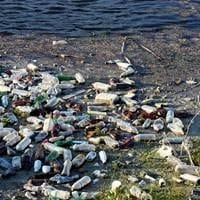(BRUSSELS) – Plans to tackle marine litter, outlined by the EU Commission Monday, would ban ten single-use plastic products most often found on Europe’s beaches and seas, as well as lost and abandoned fishing gear.
Together these items constitute 70 per cent of all marine litter items. Where alternatives are readily available and affordable, single-use plastic products will be banned from the market.For products without straight-forward alternatives, the Commission’s focus is on limiting their use through a national reduction in consumption; design and labelling requirements and waste management/clean-up obligations for producers.
“Single use plastics are not a smart economic or environmental choice, and today’s proposals will help business and consumers to move towards sustainable alternatives,” said EC vice-president Jyrki Katainen: “This is an opportunity for Europe to lead the way, creating products that the world will demand for decades to come, and extracting more economic value from our precious and limited resources. Our collection target for plastic bottles will also help to generate the necessary volumes for a thriving plastic recycling industry.”
Across the world, plastics make up 85% of marine litter. And plastics are even reaching people’s lungs and dinner tables, with micro-plastics in the air, water and food having an unknown impact on their health. Tackling the plastics problem is a must and it can bring new opportunities for innovation, competitiveness and job creation.
The EU executive says companies will be given a competitive edge: having one set of rules for the whole EU market will create a springboard for European companies to develop economies of scale and be more competitive in the booming global marketplace for sustainable products. By setting up re-use systems (such as deposit refund schemes), companies can ensure a stable supply of high quality material. In other cases, the incentive to look for more sustainable solutions can give companies the technological lead over global competitors.
After addressing plastic bags in 2015, 72% of Europeans said they have cut down on their use of plastic bags (Eurobarometer). The EU is now turning its attention to the 10 single-use plastic products and fishing gear that together account for 70% of the marine litter in Europe. The new rules will introduce:
- Plastic ban in certain products: Where alternatives are readily available and affordable, single-use plastic products will be banned from the market. The ban will apply to plastic cotton buds, cutlery, plates, straws, drink stirrers and sticks for balloons which will all have to be made exclusively from more sustainable materials instead. Single-use drinks containers made with plastic will only be allowed on the market if their caps and lids remain attached;
- Consumption reduction targets: Member States will have to reduce the use of plastic food containers and drinks cups. They can do so by setting national reduction targets, making alternative products available at the point of sale, or ensuring that single-use plastic products cannot be provided free of charge;
- Obligations for producers: Producers will help cover the costs of waste management and clean-up, as well as awareness raising measures for food containers, packets and wrappers (such as for crisps and sweets), drinks containers and cups, tobacco products with filters (such as cigarette butts), wet wipes, balloons, and lightweight plastic bags. The industry will also be given incentives to develop less polluting alternatives for these products;
- Collection targets: Member States will be obliged to collect 90% of single-use plastic drinks bottles by 2025, for example through deposit refund schemes;
- Labelling Requirements: Certain products will require a clear and standardised labelling which indicates how waste should be disposed, the negative environmental impact of the product, and the presence of plastics in the products. This will apply to sanitary towels, wet wipes and balloons;
- Awareness-raising measures: Member States will be obliged to raise consumers’ awareness about the negative impact of littering of single-use plastics and fishing gear as well as about the available re-use systems and waste management options for all these products.
For fishing gear, which accounts for 27% of all beach litter, the Commission aims to complete the existing policy framework with producer responsibility schemes for fishing gear containing plastic. Producers of plastic fishing gear will be required to cover the costs of waste collection from port reception facilities and its transport and treatment. They will also cover the costs of awareness-raising measures.
Details of new rules for fishing gear
The Commission’s proposals now go to the European Parliament and Council for adoption. The Commission says this should be a priority file, with tangible results before the European elections in May 2019.
The proposed Directive will bring both environmental and economic benefits, says the Commission. The new measures will for example:
- avoid the emission of 3.4 million tonnes of CO2 equivalent;
- avoid environmental damages which would cost the equivalent of 22 billion by 2030;
- save consumers a projected 6.5 billion.
New EU rules to ban single-use plastics - background guide








